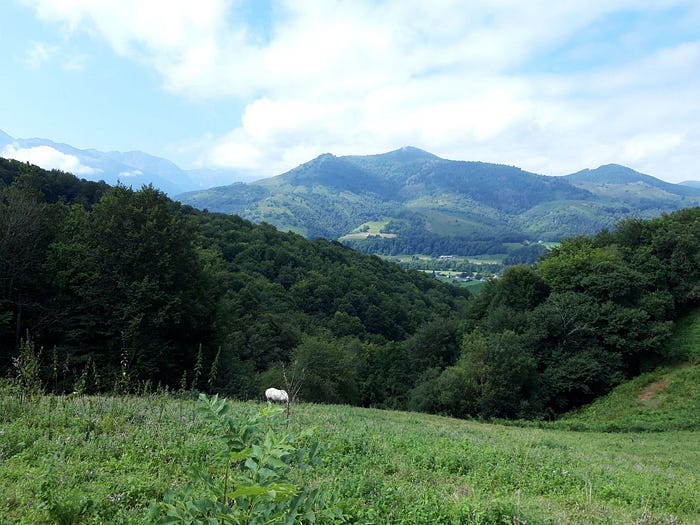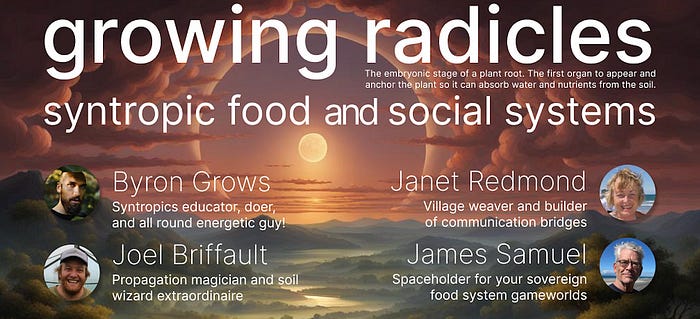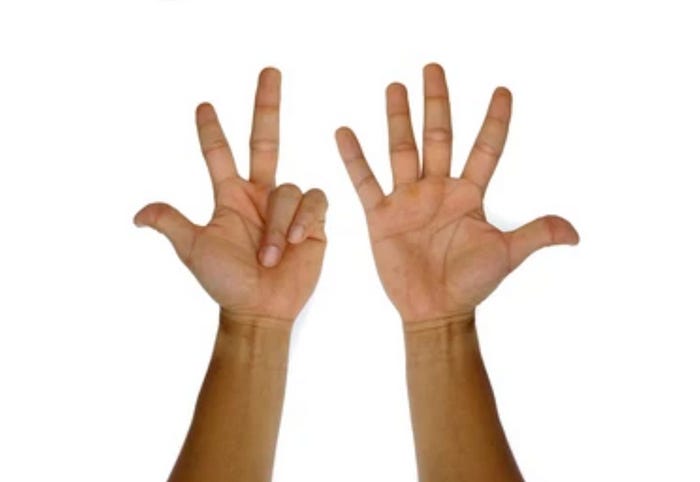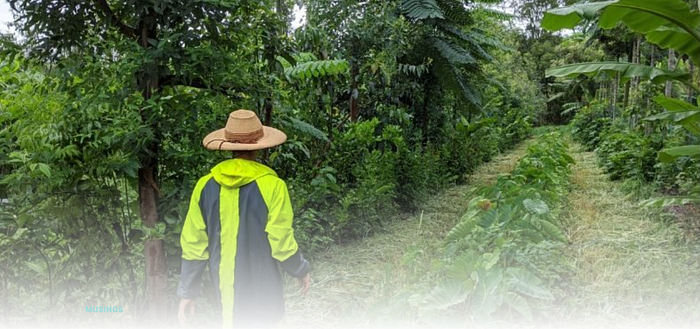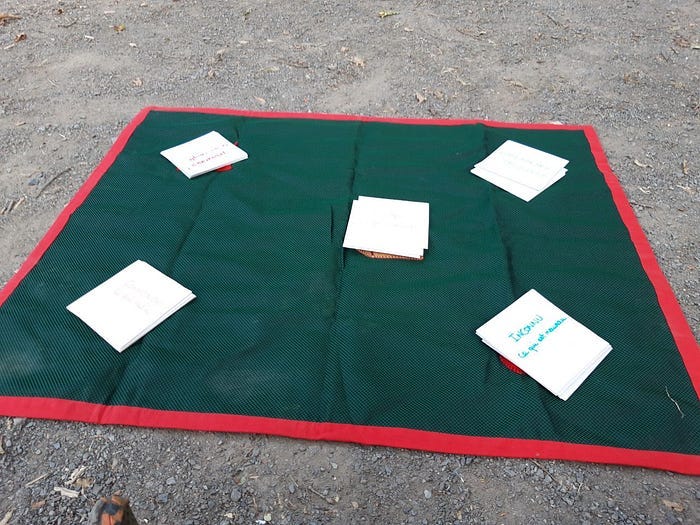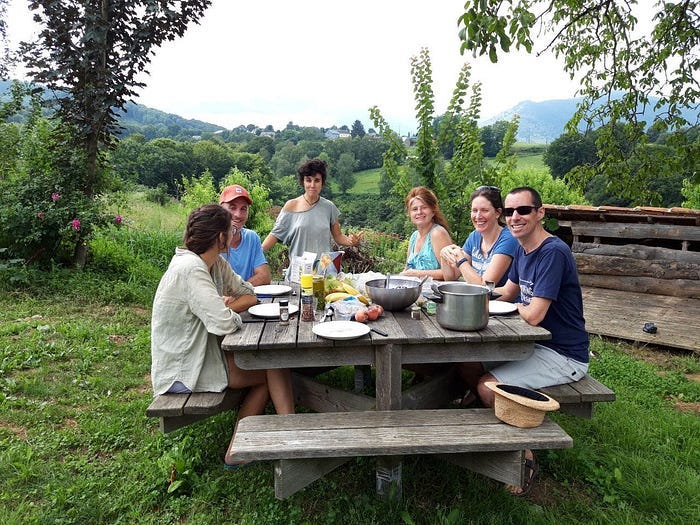Archan Permaculture in action 2
Further steps in creating an Archan Permaculture community on a land.
A community is an amount of people that decided consciously to share not only common values (Bright Principles) but also a set of rules and principles that allow them to grow together instead of creating silent wars and confusion.
Such a decision can be taken and honored if people have some basic distinctions. Here are 2 majors steps for creating clarity in community building.
1.Creating community with Resistance Decision Making and creating a clear space for logistics
Originally quoted from James Samuel, on June 15, 2024, Does community happen by accident ?
Communities happens because of Clarity of choices and sensing the resistances of the group, each individual after another. The resistance decision making is one of them, and one of the most effective to tackle the issue of coming in a group with people we don’t know by first hand.
The fears rise up and a dense field of unexpressed feelings, emotions, strategies can be sensed by the most sensitive. This is normal in modern world — yet is it absolutly Necessary that it happen that way? I don’t think so. With resistance decision making, a safe place for the wisdom of resistance is honored and granted.
Here is a testimonial about an event that happened in Aotearoa (New Zealand) and gathered a large amount of people coming together to hold space for the Earth.
Another master piece of creation of the community happening is distinguishing the logistic spaces between the others. Here is what happened.
A few people commented on the feeling of community they experienced at the three day Growing Radicles training in March. I’m glad that people felt this, and it was not an accident.
Building community was part of the Intention, from the start. I asked Janet Redmond if she would be part of the event, and so glad she had a big Yes for it. We parked the camper on site the day before the event and when we woke in the wee hours of the morning, declared an energetic workspace around the land, before calling in the bright principles of Connection, Love, Simplicity, Clarity, Healing, in support of healthy and nourished people and people.
People began arriving around 8am on day one, and at 9:30am we gathered in the opening circle.
Janet and I held space for each and every person to share what had brought them to the event, and what gifts they were bringing. This was the watering of the community radicle (embryonic root of a seedling), inviting each person to take root and declare what was their verse, in the di-versity of the gathering.
The next piece of the community creation was the introduction of a proposal culture. When someone wanted to declare the time we would break for a meal, request the focus of the next piece of learning, or how to manage emptying of the humanure compost buckets, a proposal was put to the circle. Each proposal was followed by the question: Any resistance? Resistance was shown by displaying a number of fingers from 0–10 (where 10 is maximum resistance and 0 is no resistance).
Those with higher resistance were invited to share what their resistance was about, and so the wisdom of the crowd was invited into the space. A proposal could be changed until there was no resistance, or so little that those with any remaining resistance were able to accept it, and the group could move on.
Finally we landed the distinction between logistics and other conversations. Throughout the three days, any logistical conversations were attended to at the beginning of each session, honouring the primary intention of the three day training — learning the principles and practice of Syntropic Agroforestry. By the last day Sylvanis, 9 years of age and the youngest member of our community, held the space for the logistics conversations.
2.These are some of the steps which were made to set the scene and build the social systems that created a sense of community which lasted for the three days, and beyond.
2.Setting a Gameplan
A Gameplan has nothing to do with a strategy. A strategy is meant for marketers, planers not for creators, I mean Archetypal Creators — people with real agency to source their project, act directly on the spot, create favorable situation and a highly transformative culture.
A gameplan is something that happen if you let go of the “you should do” (even the ones that your best friends might create for you). A gameplan is your Being in action, in service to life and therefore, to greater good. A gameplan happen when you let the immanent forces of nature shine through you. This is ecstatic. Beware of the hangover!
Here is a couple of breadcrumbs from Aotearoa and France, pleas take a sip of it and let me know your observations — yes I am daring to ask you for real.
The land needs people, a following article by James Andrews
A one year covenant in service to Gaia
Following on from the Growing Radicles event in March it has become increasingly clear that the land needs people. With too few people, growing food depends on machines and chemical inputs. With sufficient people collaboration with nature is possible and the result is abundance and healthy ecosystems.
140,000 hectares
New Zealand has 140,000 hectares of lifestyle blocks and small farms, situated between the urban and the large scale agriculture. These small farms change hands every 3.3 years on average, according to a NZ Herald article.
The potential of the land, and the dreams of each new owner, are often well beyond what is realised.
Buyers of these small blocks often struggle with the reality of life on the land, and having to deal with the wide range of tasks associated with care for animals and plants. Frequently one or more of the family ‘team’ have to engage in paid work off the land, in order to meet the mortgage repayments. Then they try to squeeze in all the farm’s needs after hours and on the weekends.
But a solution already exists in the form of an abundance of tiny house owners. Home ownership in NZ is at its lowest rate since 1951, and is expected to fall further. A 2010 government report found evidence of a structural shift — that younger people are less likely to achieve home ownership than ever before.
This expanding demographic is made up of people who have chosen not to complain about the inflated cost of owning a home, but have instead taken responsibility for it, within their means. However, their next step of finding a place to put their tiny house can be a challenge.
What an opportunity!
To marry the needs of these two demographics, those needing help on the land and those looking for a place to ‘land’.
Collaboration and social systems
Collaboration happens between people. And we do it well, or we do it badly. We either achieve our intentions, or fail to.
Sometimes a collaboration finds its wings, and despite struggles, continues and achieves more than it imagined! But sometimes a collaboration starts with a hiss and a roar, then fades as the realities hit!
If this is your situation, then you might be interested in what I have been researching with my partner, Janet Redmond.
We have found that what makes the difference is the presence or lack, of skills needed to articulate a shared intention, make clear agreements, and practise adult communication processes.
Fortunately these processes are learnable. The maps have been drawn, and once learnt they can be practised, until a new way of navigating the communications landscape becomes natural.
Janet and I are offering trainings for owners of land and owners of tiny houses. Over time and as needed, we will build a team to deliver these trainings and offer the ongoing support.
If you are looking to collaborate with others to benefit the land, this is for you.
Shared intention
In any land share collaboration it will be necessary to acknowledge that the land owner inherently has more power, and this could create challenging relationship dynamics.
We are looking for owners who are willing to put the matter of ownership to one side for a one year experiment. The legal structure wouldn’t change, but the focus is on ‘what does the land need?’.
This is a bold step, of people coming together in service of the Earth, of Gaia, to see the potential when people assume a level of radically responsible collaboration.
Legal agreements and radical responsibility
Imagine you’ve made an agreement and have engaged a lawyer to craft it into a legal document. Great, all is clear. Well, maybe. What happens when the other party doesn’t keep their end of the agreement as you understand it? Will you use the document as a weapon and threaten legal action, and let the lawyers fight it out for you. Maybe it even goes to court.
Feel the pain of this for a moment, and notice what’s happening.
You are no longer relating to the other party in the agreement, and have now given away your power and responsibility for the outcome, and put it in the hands of a third party. The lawyers or the judge in the court will end up making a ruling and both parties are expected to go along with it. You may or may not be happy with it, but almost certainly you won’t be sitting around with each other over a cup of tea.
Is there another way?
As the cornerstone of a collaboration we can co-create covenants / agreements that have sufficient clarity to be a starting point for dialogue when things are not going well. When disagreements arise we can call on our support team, to help us navigate communications, so that both sides are heard and felt. So we can discover the next collaborative step.
Imagine a one year covenant that can be updated by agreement, but that puts no obligation on either party beyond that term.
Communications processes and upcoming events
At the ongoing centre of any collaboration is communication. And communication can come in many different forms, and produce many different results.
The invitation is to learn and practise new communication skills, knowing you will not always get it right, but that you can periodically call on your support team and go again.
We are here and ready to assist, so reach out and have a chat. Trainings are designed to meet the specific needs of land share collaboration and are informed by Possibility Management.
Wednesday August 14th, from 7pm — 8:30pm at Riverside Centre, Lower Moutere
A public meeting will be your chance to hear more about the ideas, the vision and how it might support you.
Saturday August 17th, from 9am — 4pm at Riverside Centre, Lower Moutere
A one day training where you will learn and practice, how to build communication bridges. You will take away maps that can assist your practice of these skills.
First step: Register here — the link now works :-)
Or email jmsinnz@gmail.com to express interest
A intimacy game experiment to familiarize with feelings and coaching.
The Inner Permaculture game applied to oneself: “What does the potatoes feel?” continues to be tried out at festivals, at the Village de l’eau in Deux-Sèvres (79) and at the Festival des Oasis in Ariège (09).
The aim is simple: to reconnect people with their desire to reconnect.
Questions like:
“What makes you angry?”
“What allows you to carry your dream and make it happen?”
or “How do you connect with plants, trees, animals and the Earth?” are intimate questions that introduce us to the world of coaching and our invisible worlds.
If someone had told me ten years ago that I’d be a coach, I’d probably have laughed. And yet that’s what I am now.
Coaching enables each of us to master the art of questioning, to get involved on behalf of others, to develop empathy and to allow others to step out of their comfort zones. Through cards with involving questions, everyone — regardless of their path — can familiarize themselves with the practice of coaching in the service of a new culture (for those of you familiar with sports or corporate coaching, this has nothing to do with it).
Fortunately, life is full of surprises. While some of us — myself included — focus on the problems, we could also focus on the surprises, whatever they may be.
Today, I no longer limit myself, I assume my quality of transformer, of magician of the moment. There’s no longer the smoke of doubt, the razor of rationalization, nothing: I take action.
The invitation is the same throughout this game: to invite action, to involve the other person and yourself, to dare to ask dangerous questions that will lead to unexplored, unexpected conversations and… surprises.
A framework of consent is established, and facilitation depends on the individual. What’s going to happen? We’re now thinking about coaching cards to teach new facilitators to communicate directly, through feelings (the heart), rather than through the head (concepts, ideas).
The first step in this game is to go back to the first feelings: anger, fear, sadness, joy. The second step is to take the first step for the initiator of the game: to show ourselves as we are. A new culture cannot emerge without this step. Much will be determined by the first step!
It starts with: “I feel angry because…” instead of “I think that…”, while letting your voice vibrate to the sound of the feeling you’ve begun to share the cause of.
And what if this game — on an unreasonable scale, given the quality of the players’ involvement — were to bring about changes in communication, opening doors to new-found intimacy and unexpected authenticity?
That’s what this game is all about, bringing strangers together around a table or a stretch of road to exchange ideas and realize how extraordinarily compatible their perceptions are.
This game already invites and provokes change, and will you be part of it?
To meet us, write to gabriel.lechemin@gmail.com or follow our adventures — pioneers of this game Ludivine and myself — via the Archan Permaculture channel on Telegram.
And our Gameplan then ?
To co-create our Bridge-House and Permaculture Coffee project in the Bagnères de Bigorre area during the Summer Camp.
Inviting people crazy enough to take up the challenge of co-creation in the Unknown: a program created in the moment, with new people arriving day by day.
But here we are: a team of 12 people (plus others coming in by the day) spending 8 to 9 days together on this epic journey.
If this plan speaks to you or this project speaks to you, I invite you to the day of celebration on Saturday August 17, 2024 to celebrate the achievement of our common project, or to join us on the go for a day by signing up!
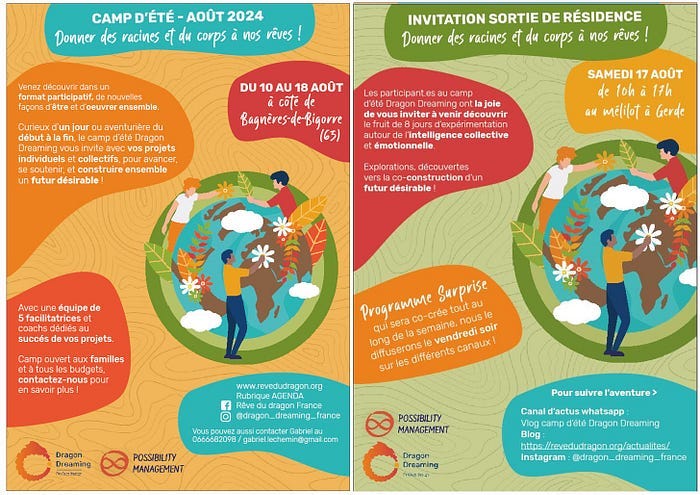
Free registration links and donation campaign: https://revedudragon.org/summer-camp-2024/
The team, almost in its entirety, salutes you!
The first day of preparation was rich in experiences of decision by resistance: very effective. Then we worked on delimiting the logistical spaces from the heart-sharing spaces, the practice validating what is set up on the other side of the world in Aotearoa: these are two fundamental distinctions for groups to function effectively.
Welcome to our site!
I feel glad our two events in Aotearoa and in France connect and go in parallel.
Go! Team Gaïa!


